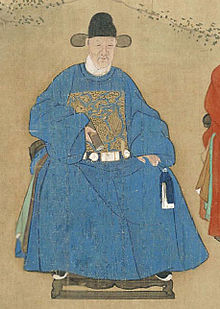Li Dongyang
Li Dongyang | |
|---|---|
 | |
| Senior Grand Secretary of the Ming Dynasty | |
| In office 1506–1512 | |
| Preceded by | Liu Jian |
| Succeeded by | Yang Tinghe |
| Personal details | |
| Born | 1447 |
| Died | 1516 (aged 68–69) |
| Nationality | Chinese |
Li Dongyang (simplified Chinese: 李东阳; traditional Chinese: 李東陽; pinyin: Lǐ Dōngyáng, 1447-1516) was a Chinese historian, poet, and politician during the Ming dynasty.
Born in Beijing, Li was deemed to be a prodigy, writing long articles since 4 years old. Thus, he was invited by the Jingtai Emperor to the court for testing, the Ming emperor even held him on the lap. Thus, Li gained the favour of the emperor since his childhood. Later, the emperor requested his presence twice for his own interpretation on Shangshu and was delighted by his response. In 1464, Li Dongyang ranked second in the court exam and entered the Hanlin Academy afterwards. From 1465 to 1467, he was included in the project of compiling Veritable Records of the Jingtai Reign (Yingzong shilu).[1][2]
In 1505, Li Dongyang, Liu Jian and Xie Qian were entrusted to lead a transitional cabinet and support the crowned prince, by the testate emperor. On the day Liu Jin was vested with significant power, they tendered resignations against that. But the emperor merely refused Li's.
He served as an official under four emperors for over 50 years in roles including "Grand Historian" and "Minister of Rites" and Senior Grand Secretary, the highest post in Ming civil government. He is also known for his distinctive poetry and was commissioned to compile the Collected Statutes of the Ming Dynasty.[citation needed]
References
External links
- Li Dongyang ("Renditions" magazine)
